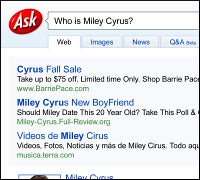 The revamped Ask.com. Click to enlarge. Source: Ask.com |
Ask.com unwrapped a major set of improvements to its search engine today as part of its core mission to deliver better results to users more efficiently than the competition — even as it continues to be dwarfed by the likes of ever-growing Google.
The site’s enhancements aim to bring Ask.com steps closer to its goal of providing users with the best answer to their search queries the first time they ask — and, with the answer appearing on the results page itself, according to Ask.com president Scott Garell.
“The data still says it takes three to four clicks with the major search engines. With this launch, we’ve made great strides toward reducing that,” Garell told InternetNews.com. He also said the site delivers results about thirty percent faster than a year ago.
For Ask.com, the changes serve as the latest move to set itself apart from the larger giants of search. Google, for instance, held 63 percent of the market in August, according to comScore research — up from 61.9 percent in July. Yahoo! came in second in August with 19.6 percent, followed by Microsoft, with 8.3 percent. Ask.com, meanwhile, ranked No. 4, with 4.8 percent, just ahead of AOL’s 4.3 percent share.
There are several patent-pending technologies in the revamped Ask.com, as well as a sleeker, simpler home page that’s even a bit more Spartan than the basic Google (NASDAQ: GOOG) page. For those that don’t prefer a basic-looking page, Ask.com also offers “skins”, a series of colorful backgrounds to enable users to personalize the otherwise white background. They can also upload their own background.
“When someone does that with a photo of their kids or other personal image, we’ve seen as much as an 80 percent jump in the amount of searches they do,” Garell said.
However, Ask.com’s effort to stand apart comes chiefly in the form of a design that aims to deliver immediate answers to search queries along with links to useful related matter.
An area called “Ask Q&A” appears in the right hand column of search results — where other sites place text ads — and features a list of questions related to a user’s search, designed to expose a different set of relevant results to a query.
For example, a recent search on “John McCain” produced 4,744 “questions about John McCain” under Ask Q&A, including such questions and results for “Who Would Bin Laden Vote For, John McCain or Barack Obama?”, “What is John McCain’s religion?” and “Was John McCain ever a Democrat?” (Answer: No.)
The Ask Q&A list appears as a link that expands when clicked. A list of related searches appears under the link. In the case of a search for Barack Obama, the Related Searches list starts with “Barack Obama Biography”, “Where was Barack Obama Born?”, “Facts About Barack Obama”, and so on.
Tapping long-tail content
New technology taps hundreds of thousands of user-generated content sites to bring so-called “long tail” content to the fore. Garell said Ask has also focused on deep research into high-volume search areas, including Entertainment, Health & Nutrition, Jobs and Reference.
For example, ask the question, “What time is Heroes on?” and the top of the Ask.com results page is chock-full of reference sites for the NBC sci-fi television show, including information on when it airs. The same query on Google results first in a link to NBC’s official Heroes site, followed by several results unrelated to the TV show — save for a UK-based entertainment site.
Jupiter Research analyst Evan Andrews credits Ask.com for trying some new things to set itself apart. “No one is going to grab Google’s market share overnight, but I do applaud Ask for making an effort with blended search results and universal search,”
Andrews told InternetNews.com. “They are arguably the pioneer of the blended search, including images and other kinds of results. For people who use search a lot, more information is better, and I think Ask is catering to those kinds of users.”
While the term “Google” has become synonymous with search (as in the expression “Google it” when looking for something), Andrews said his research has shown users will often go to another search engine if they don’t get the results they want on the first try.
“I think, with these new sets of results, Ask is hoping more folks will come over from Google,” Andrews said.
Ask.com has also always had a certain appeal to newbies. Ever since its original AskJeeves incarnation, Ask has been designed to accept full-sentence English language queries, not just a set of search terms: “What teams are in the baseball playoffs?” versus, for example, simply “baseball playoff teams”.
“Ask has always done innovative work with its results pages, structured feeds and certain categories of data,” said analyst Charlene Li, who heads the Altimeter Group consulting firm. “Their ambition isn’t necessarily to take on Google (NASDAQ: GOOG).
What they’re defining as success is hyper-serving their core users to make sure Ask is their first choice.”
One way Ask can do that, Li said, is by focusing on popular search areas like health, entertainment and jobs.
“I think Ask knows where its strength is going to be, and it’s very smart of them not to try and be a Google slayer,” she said. “They’re very amenable to try new things, and my hat’s off to them for that.”


